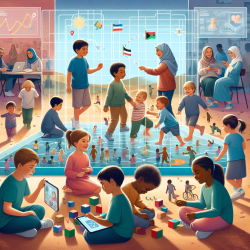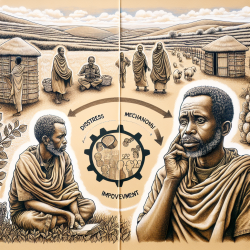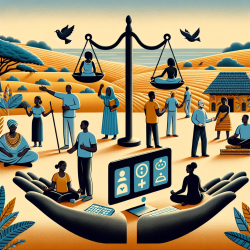Introduction
In a world where political violence and conflict are unfortunate realities, children often find themselves at the forefront of these crises, facing challenges that can significantly impact their mental health and development. The research article titled "Development of a Multi-Layered Psychosocial Care System for Children in Areas of Political Violence" offers a comprehensive approach to addressing these challenges. This blog aims to provide practitioners with insights on how to implement these research outcomes to improve their skills and encourage further exploration in this vital field.
The Multi-Layered Approach: A Framework for Success
The research outlines a multi-layered psychosocial care system designed to address the diverse needs of children affected by political violence. This approach is built on several key principles:
- Normalization and Recreation: Emphasizing the importance of normalizing daily life and providing recreational activities to support children's mental health.
- Social Support and Reintegration: Encouraging social reconnection and support mechanisms to foster resilience and community integration.
- Utilizing Local Resources: Building on existing community coping strategies and resilience mechanisms to provide culturally sensitive care.
- Comprehensive Care: Addressing needs across social-pedagogic, psychosocial, psychological, and psychiatric domains.
Implementing the Model: Steps for Practitioners
Practitioners looking to implement this model can take the following steps:
- Community Engagement: Begin by engaging with the community to understand their specific needs and resources. This involves working with local stakeholders to create a supportive environment for children.
- Screening and Assessment: Utilize validated screening tools to identify children at risk and tailor interventions to their specific needs. This ensures that resources are allocated efficiently and effectively.
- Tiered Interventions: Implement a tiered system of care that includes community-based interventions, group activities, and specialized care for those with severe needs. This approach ensures that all children receive the appropriate level of support.
- Monitoring and Evaluation: Regularly evaluate the effectiveness of interventions to ensure they are meeting the desired outcomes. Use data-driven decisions to refine and improve the care system.
Encouraging Further Research
While the multi-layered approach provides a robust framework for addressing the psychosocial needs of children in conflict zones, there is always room for further research and development. Practitioners are encouraged to explore additional areas of study, such as:
- The impact of cultural variables on the effectiveness of interventions.
- Long-term outcomes of children who have participated in the care system.
- Innovative strategies for integrating psychosocial care into existing educational and healthcare systems.
Conclusion
By implementing the outcomes of this research, practitioners can play a crucial role in creating positive change for children affected by political violence. The multi-layered psychosocial care system offers a comprehensive and adaptable framework that can be tailored to meet the unique needs of each community. As we continue to learn and grow in this field, we must remain committed to data-driven decisions and evidence-based practices that prioritize the well-being of children.
To read the original research paper, please follow this link: Development of a Multi-Layered Psychosocial Care System for Children in Areas of Political Violence.










